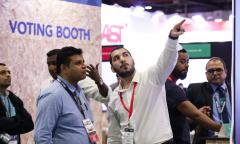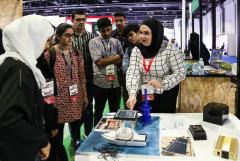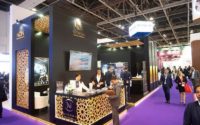Region’s Young Engineers Shine Light On Intelligent Energy Solutions At ‘Future Generation’ Competition
Some of the region’s brightest young engineers have showcased a wave of intelligent, next-generation solutions designed to solve today’s greatest power challenges during the sixth Future Generation competition, a knowledge development component of this week’s Middle East Electricity at Dubai World Trade Centre (DWTC).
Held under the theme Smart Energy Solutions: Improve Energy Efficiency, the competition sees teams of Undergraduate and Postgraduate students from 10 of the region’s leading universities judged in three key criteria: ideas or solutions to combat excessive use of power, cost-effective solutions to reduce energy consumption, and producing a prototype alongside a testing partner.
A team from Manipal Academy of Higher Education – Dubai Campus has been displaying its Electro-magnetic Induction-based Road (EMIR) project, which aims to make operating electric vehicles (EV) far cheaper by building dynamic road-side charging mechanisms for EV batteries.
“The team has spent nearly seven months researching, developing and completing the EMIR project because we believe more people will switch from fuel-run vehicles if we make operating EVs cheaper,” said Bilal Sultan, a student from Manipal Academy of Higher Education – Dubai Campus.
Elsewhere, a team from King Abdullah University of Science and Technology (KAUST) in Saudi Arabia, wowed judges with its Magnetic RAM (MRAM) project. The new memory technology solution is based on non-volatile magnets which do not need a continuous supply of power and, therefore, provide a key advantage over other existing solutions.
“Digital device penetration and the prevalence of IoT-enabled products globally mean the world is experiencing a data explosion. We are generating more data than we can store and it’s a major challenge,” said Ulan Myrzakhan, a KAUST student. “With our MRAM solution, we are trying to implement multi-states in a single memory cell to improve performance. If this technology was widely adopted in smart devices the power savings would be significant because of MRAM’s non-volatile nature in storing data.”
Meanwhile, a team from the UAE’s Higher Colleges of Technology is displaying an IoT-based Efficient Smart House, a system which uses a senor network to reduce power consumption costs. “We conducted research on energy consumption in the UAE and found there has been a significant increase in power consumption,” said Zayed Al Hashmi, a student from HCT. “Our objective was to minimise energy consumption to reduce costs and we delivered: our Efficient Smart House generated an 87 per cent decrease in power consumption.”
In addition to HCT, Manipal Academy and KAUST, participating universities include the UAE’s Khalifa University, the University of Sharjah, Abu Dhabi University, the American University of Sharjah, the Rochester Institute of Technology, the University of Wollongong, and United Arab Emirates University.









